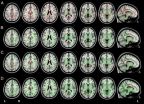ACMG says ClinGen will be critical resource for interpretation of genome-scale testing
ACMG says ClinGen will be critical resource for interpretation of genome-scale testing to improve patient care
2015-05-27
(Press-News.org) Tremendous advances have been made in decoding the human genome in recent years but critical questions remain regarding what these variants mean and how they can be applied in clinical practice. In a comprehensive paper to be published in The New England Journal of Medicine on May 27, 2015, "ClinGen: The Clinical Genome Resource," a consortium including investigators from the American College of Medical Genetics and Genomics (ACMG) provide a detailed overview of ClinGen, an NIH-supported program to evaluate the clinical relevance of genetic variants for use in precision medicine and to increase the understanding of their role in human health and disease.
ACMG Executive Director Michael S. Watson, PhD, FACMG said, " With ClinGen and ClinVar now in place to manage the big data problem inherent in medical genomics, we are well positioned to enable extensive data sharing among laboratories and clinician. This is expected to dramatically improve our understanding of the clinical implications of genetic variation and its role in improving patient and population health."
ClinGen's mission is to build a genomic knowledgebase to improve patient care. Genetic clinicians and medical researchers hope to use information about genetic variants in a variety of ways including making better predictions about an individual's risk of disease, to developing tailored treatments and to improve clinical decision-making.
"We're dealing with massive amounts of information: more than 80 million genetic variants have been discovered to date, and for most of them, we have no clear understanding of their role in human health and disease," said Heidi Rehm, PhD, associate professor of Pathology at BWH and director of the Laboratory for Molecular Medicine at Partners HealthCare Personalized Medicine and lead author of the paper. As genetic sequencing becomes more common, interpreting data in a meaningful way and standardizing practices is imperative. The enormity of the situation is daunting, but the potential impact on patient care has immense implications."
The paper in NEJM states, "...the American College of Medical Genetics and Genomics (a ClinGen grantee), working with members of the sequence and structural variant communities, have developed new standards for interpreting genetic variants. ClinGen is now working with laboratories to facilitate adoption of the new standards and openly share the basis of their pathogenicity assertions. This allows labs to resolve interpretation differences through expert consensus and applications of these standardized methods which will rapidly improve the use of genetic testing in the clinical setting."
One important part of ClinGen is ClinVar, a publicly-accessible database launched in April 2013 at the National Center for Biotechnology Information (NCBI), which archives information submitted about genetic variants with medical relevance. Clinicians, researchers and patients can look up information on ClinVar to see what is currently known about a genetic variant. According to the paper's authors, "...the ClinVar database is ...being embraced by patients and physicians as a system for sharing up-to-date information on clinically reported genetic variants."
INFORMATION:
ClinGen is funded by the National Human Genome Research Institute, with additional funding from the Eunice Kennedy Shriver National Institute of Child Health and Human Development and the National Cancer Institute (U41 HG006834, U01 HG007436, U01 HG007437, HHSN261200800001E). ClinVar is supported by the Intramural Research Program of the NIH, National Library of Medicine.
About the American College of Medical Genetics and Genomics (ACMG)
Founded in 1991, ACMG is the only nationally recognized medical society dedicated to improving health through the clinical practice of medical genetics and genomics. The American College of Medical Genetics and Genomics provides education, resources and a voice for more than 1750 biochemical, clinical, cytogenetic, medical and molecular geneticists, genetic counselors and other healthcare professionals, nearly 80% of whom are board certified in the medical genetics specialties. The College's mission is to develop and sustain genetic initiatives in clinical and laboratory practice, education and advocacy. Three guiding pillars underpin ACMG's work: 1) Clinical and Laboratory Practice: Establish the paradigm of genomic medicine by issuing statements and evidence-based or expert clinical and laboratory practice guidelines and through descriptions of best practices for the delivery of genomic medicine. 2) Education: Provide education and tools for medical geneticists, other health professionals and the public and grow the genetics workforce. 3) Advocacy: Work with policymakers and payers to support the responsible application of genomics in medical practice. Genetics in Medicine, published monthly, is the official ACMG peer-reviewed journal. ACMG's website offers a variety of resources including Policy Statements, Practice Guidelines, Educational Resources, and a Find a Geneticist tool. The educational and public health programs of the American College of Medical Genetics are dependent upon charitable gifts from corporations, foundations, and individuals through the ACMG Foundation for Genetic and Genomic Medicine.
ELSE PRESS RELEASES FROM THIS DATE:
2015-05-27
Women who eat a Mediterranean diet could cut their risk of womb cancer by more than half (57 per cent), according to a study published today (Wednesday) in the British Journal of Cancer*.
The Italian researchers looked at the diets of over 5,000 Italian women to see how closely they stuck to a Mediterranean diet and whether they went on to develop womb cancer**.
The team broke the Mediterranean diet down into nine different components and measured how closely women stuck to them. The diet includes eating lots of vegetables, fruits and nuts, pulses, cereals and potatoes, ...
2015-05-27
If greenhouse-gas emissions continue to rise, glaciers in the Everest region of the Himalayas could experience dramatic change in the decades to come. A team of researchers in Nepal, France and the Netherlands have found Everest glaciers could be very sensitive to future warming, and that sustained ice loss through the 21st century is likely. The research is published today (27 May) in The Cryosphere, an open access journal of the European Geosciences Union (EGU).
"The signal of future glacier change in the region is clear: continued and possibly accelerated mass loss ...
2015-05-27
The psychological strain of being told that you may have breast cancer may be severe, even if it turns out later to be a false alarm. This is the finding of new research from the University of Copenhagen, which has just been published in the scientific journal Annals of Family Medicine. Researchers call for improving screening accuracy, thus reducing the number of false-positive mammograms.
It was a false alarm. You don't have breast cancer. This ought to be a happy message for women who have been through a mammography screening which initially showed signs of something ...
2015-05-27
OAK BROOK, Ill. - Degeneration of the white matter of the brain may be an early marker of specific types of Alzheimer's disease (AD), including early-onset AD, according to results of a new study published in the journal Radiology.
"Alzheimer's is a gray matter disease," said Federica Agosta, M.D., Ph.D., co-author of the study conducted at the Neuroimaging Research Unit, San Raffaele Scientific Institute in Milan, Italy. "However, white matter damage has a central role in how the disease strikes and progresses."
AD is an irreversible, progressive brain disease that ...
2015-05-27
The first practical guide to ensure the safe use of flavourings in e-cigarettes has been published (Regulatory Toxicology and Pharmacology DOI: 10.1016/j.yrtph.2015.05.018).
E-cigarettes and other vaping products contain a nicotine-based liquid that is vapourised and inhaled. There is no combustion so the user inhales vapour, not smoke. This means that e-cigarettes deliver nicotine without smoke toxicants. However, some in the public health community still have expressed concerns over the potential health impacts of flavourings used in e-cigarettes.
This is why the ...
2015-05-27
The spinal tumor grew back. Even though the 16-year old patient endured surgery a year earlier to remove and diagnose the lesion, it was back and its cause unknown. Determined to identify the tumor tissue and set the patient on an appropriate treatment regimen, Albert Telfeian, M.D., a neurosurgeon at Rhode Island Hospital and Hasbro Children's Hospital, performed the first reported case of extracting the tumor endoscopically while the patient was awake and under a local anesthetic. The minimally invasive procedure enabled accurate diagnosis, which evaded multiple physicians ...
2015-05-27
New research published today in Diabetologia (the journal of the European Association for the Study of Diabetes) indicates that consuming greater quantities of dietary fibre reduces the risk of developing type 2 diabetes.
Over 360 million people worldwide are estimated to be affected by diabetes, and this number is projected to increase to more than 550 million by 2030, with serious consequences for the health and economy of both developed and developing countries. While previous research has found an association between increased dietary fibre intake and a reduced risk ...
2015-05-27
Professor Teppo Järvinen and colleagues say drug treatment "can achieve at best a marginal reduction in hip fractures at the cost of unnecessary harms and considerable waste of monetary resources." The article is part of The BMJ's Too Much Medicine campaign -- to highlight the threat to human health and the waste of resources caused by unnecessary care.
Worldwide, about 1.5 million hip fractures occur each year. They impose an enormous burden on healthcare resources and, with a growing elderly population, their incidence is predicted to rise.
Before the late ...
2015-05-27
The results show that pills containing one of the newer types of progestogen hormone (drospirenone, desogestrel, gestodene, and cyproterone) are associated with an increased risk of VTE than pills containing older progestogens (levonorgestrel and norethisterone).
The researchers, based at the University of Nottingham, say this is "an important clarifying study" that "has sufficient power to provide reliable comparative findings for different formulations of combined oral contraceptives."
About 9% of women of reproductive age worldwide use oral contraceptives, rising ...
2015-05-27
James Rucker, a psychiatrist and honorary lecturer at the Institute of Psychiatry, Psychology and Neuroscience, King's College London, describes how these drugs "were extensively used and researched in clinical psychiatry" before their prohibition in 1967.
He explains that many trials of psychedelics published before prohibition, in the 1950s and 1960s, suggested "beneficial change in many psychiatric disorders".
However, research ended after 1967. In the UK psychedelic drugs were legally classified as schedule 1 class A drugs - that is, as having "no accepted medical ...
LAST 30 PRESS RELEASES:
[Press-News.org] ACMG says ClinGen will be critical resource for interpretation of genome-scale testing
ACMG says ClinGen will be critical resource for interpretation of genome-scale testing to improve patient care

